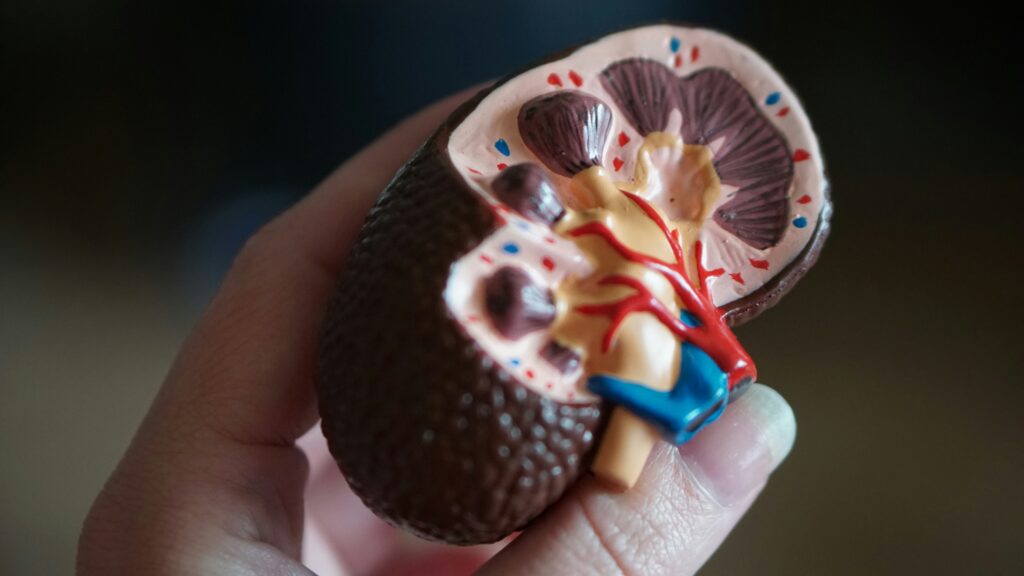In this series, I’ve been diving into my own health check results to explore what they mean and how to take action. This week, it’s all about kidney function—an area that surprised me with a few mildly concerning findings. While my results aren’t terrible, they are a reminder that kidney issues often develop silently without symptoms until they’ve progressed significantly.
About me – I’ve historically been a fairly fit and healthy person, not overweight (although I did decide to lose some weight a couple of years ago) and been lucky enough not to have major health problems in the past.
What Do Kidney Function Tests Measure?
Kidney function tests evaluate how well your kidneys filter and remove waste, balance electrolytes, and regulate fluids. The tests typically include:
- Creatinine: A waste product from muscle activity filtered out by the kidneys. Elevated levels may indicate impaired kidney function.
- Urea: Another waste product that reflects protein metabolism and kidney filtration efficiency.
- eGFR (Estimated Glomerular Filtration Rate): A calculated value based on creatinine, age, sex, and ethnicity, providing an estimate of how efficiently the kidneys filter blood.
- Electrolytes (Sodium, Potassium): Abnormal levels may indicate kidney dysfunction or other systemic issues.
- Phosphate: Elevated levels can suggest reduced kidney ability to clear excess phosphate.
These tests collectively provide a detailed picture of kidney health, allowing for early detection of issues like chronic kidney disease, autoimmune conditions, dehydration, or other underlying conditions that may need further investigation or treatment.
The Importance of a Urine Dipstick Check
A urine dipstick check is a simple yet invaluable tool for assessing kidney health. It can detect abnormalities such as protein, blood, glucose, or signs of infection in the urine, often before symptoms become apparent. For example, the presence of protein (proteinuria) may indicate early kidney damage, while blood in the urine can signal underlying conditions like kidney stones or infections. Combining this test with blood work provides a more comprehensive picture of kidney function and overall health, enabling earlier intervention and better management of potential issues.
Together, all these markers offer a snapshot of kidney health, even before symptoms like fatigue, swelling or urine changes appear.
My Results: What Do They Indicate?
Here’s a breakdown of my findings:
- A normal urine dip -thankfully no protein or blood leaking out from my kidneys.
- eGFR of 85: Slightly below the “normal” threshold of 90, suggesting a mild reduction in filtration efficiency.
- Raised Creatinine and Urea: These may indicate that my kidneys aren’t keeping up as well as they should with filtering waste.
- High Phosphate: This could point to a build-up due to reduced kidney function, or too much coming in through my diet.
- Low Vitamin D: A common finding that may also influence kidney health, as vitamin D helps regulate calcium and phosphate metabolism.
Possible Causes
Kidney function can be influenced by various factors, including:
- Dehydration: I have to admit that I’m someone who is guilty of poor hydration – during long, busy workdays I’m bad at keeping my fluid intake up and this is likely a contributing factor. Inadequate fluid intake can temporarily reduce kidney function and concentrate waste products in the blood.
- Dietary Factors: High phosphate levels may be linked to a diet rich in processed foods or certain medications.
- Subclinical Chronic Kidney Disease (CKD): While hopefully not the case for me, it’s important to rule this out with further tests and monitoring, and intervene early if required. Some decline in kidney function as we get older may be expected, but the trend over a series of tests can point to potentially bigger future problems.
- Vitamin D Deficiency: Low vitamin D can suggest impaired kidney function and can in turn affect bone health, as the kidneys play a role in activating this vital nutrient.
What’s Next?
While my results aren’t overly worrying, they highlight the need for early action to prevent ongoing deterioration:
- Improving Hydration: I’m committing to better hydration practices—keeping a water bottle handy and setting reminders during long shifts.
- Dietary Adjustments: I’m reviewing my diet to reduce processed foods and considering a balanced intake of calcium and phosphate to support kidney health.
- Vitamin D Supplementation: Starting on a vitamin D supplement to address the deficiency and improve overall health.
- Repeat / Further Testing: I’m scheduling follow-up blood tests in about 6 months to monitor kidney markers and assess the impact of these changes. If they don’t correct themselves to normal I may go on to look at other tests such as Parathyroid Hormone, which plays a role in the balance of phosphate and Vitamin D levels.
Takeaway Message
Kidney health often goes unnoticed until problems escalate, making intermittent checks important. If you’re due for a health check or notice anything unusual, don’t hesitate to seek advice—early detection and small lifestyle changes can make a big difference.
Stay tuned for my next post, where I’ll be looking at my cholesterol results, what they mean for my long-term cardiovascular health and the changes I’m going to have to make!
If you find our health information blog posts useful please hit like or let us know in the comments box below. Also, let me know if there are any subjects you’d find interesting for future blog articles!

